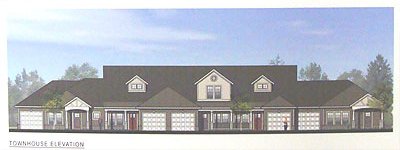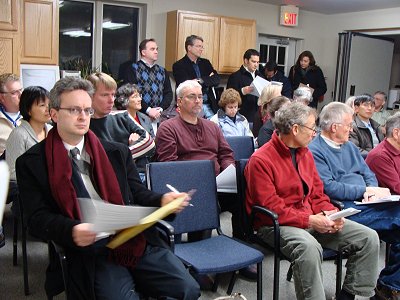- By Dan Veaner
- News
 Print
Print  The Village of Lansing Trustee meeting uncharacteristically had a full house Monday as concerned residents came to learn about a proposed 65 unit affordable housing project. Some residents were hostile to the project while others wanted answers to a variety of questions that spanned from the type of financing, management, traffic, and the process by which developers would work with Village officials to get the project approved. Mayor Donald Hartill said that the property is currently zoned to accommodate more than 80 units, but a Planned Development Area (PDA) approach will mean that about half the property will remain forever wild.
The Village of Lansing Trustee meeting uncharacteristically had a full house Monday as concerned residents came to learn about a proposed 65 unit affordable housing project. Some residents were hostile to the project while others wanted answers to a variety of questions that spanned from the type of financing, management, traffic, and the process by which developers would work with Village officials to get the project approved. Mayor Donald Hartill said that the property is currently zoned to accommodate more than 80 units, but a Planned Development Area (PDA) approach will mean that about half the property will remain forever wild."In the PDA approach the forever wild area would be forever wild... period," Hartill said. "It would be very difficult to change it, because it would be part of legislation that is very hard to change. That's the reason that we've come to this point."
 Lansing Reserve would have 65 town home units, ranginf from one storey, two bedroom, to two storey, four bedroom units
Lansing Reserve would have 65 town home units, ranginf from one storey, two bedroom, to two storey, four bedroom unitsDevelopers are proposing 65 housing units ranging from two bedroom, single storey units to four bedroom, two storey units. Each would have a single car garage, and the area is laid out in such a way that more than half of the property will remain forever wild. Tax credits granted to investors and a Payment In Lieu Of Taxes (PILOT) agreement will make it possible for developers to keep rents down, making Lansing Reserve a significant part of the solution to the affordable housing crunch Tompkins County is currently suffering. Better Housing of Tompkins County has partnered with NRP, a company that specializes in building rental units and finding financing nationally. Better Housing will be the majority owner and manager of the project.
"One thing I hope people will keep in mind is that we're not absentee landlords," said Better Housing Executive Director John Spence. "We live here, we work here, so we think we will be responsive not only to the needs of our tenants, but to the community as well."
Resident Yasamin Miller expressed concerns about road access to the project, the possibility of eminent domain, and the accuracy of statements made in a project application, and asked detailed questions about the Village Trustees' stand on the project and the approval process. Other residents asked about why tax credits were necessary, and the impact of 63 new units on the school system.
 The Village of Lansing meeting room was filled Monday with residents concerned about the proposed project's impact on their neighborhood
The Village of Lansing meeting room was filled Monday with residents concerned about the proposed project's impact on their neighborhoodNRP's Christopher Dirr said that the PILOT and federal tax abatement allow the development to keep rents down to make the rents affordable. He also argued that while federal tax credits do cost taxpayer money, the benefit of being able to build affordable housing that it buys is a real benefit to the local community. He said the distinction of financing the project with tax credits is that the project agrees to limit the amount of rent for a fifteen year period, something they wouldn't otherwise be able to afford to do.
"Does it cost everybody something? It does," he said. "However if we don't use it in this community another community is going to use it. And if we don't use it in New York State another state is going to capture it from the national pool and use it. So from this perspective I say that it will be better for this community to reap some of the rewards of those tax credits, because they will be utilized."
He added that without tax credits the developer would need public roads that would have to be maintained at public expense, rather than the private roads that are proposed. He also noted that under this kind of financing there is more oversight to make sure the development is well maintained. He said that if the PDA is not approved the company will go back to the 80+ unit idea that is already allowed by current zoning.
Village Attorney David Dubin explained that a PDA allows the municipality to modify the zoning provisions for a specific project site. The process has a lot of checks and balances, intimately involving the Planning Board and Board of Trustees. Ultimately the Board of Trustees legislates the conditions of the project, which defines the special zoning conditions for that limited area. He noted that PDAs allow the Trustees to move projects forward that benefit the Village and the County community as a whole.
Tompkins County Legislature Chair Martha Robertson argued in favor of the project, saying that there is a severe lack of housing that is affordable to people who work in the county. She said Lansing Reserve would be exactly the right kind of place for these people, who currently commute from other counties, to live.
"To the extent that people can live closer to the places where they work, all of us have less of a challenge with traffic when people live near public transit, or if they can even walk to work it is even better," she said. "(The Tompkins County Legislature has) developed a strategy in our comprehensive plan that emphasizes nodal development and in-fill development, which means rather than sprawl in the rural areas of the county where people are driving farther to get to where they have to go, build the housing close into the services and employment. You're maximizing the benefit. Housing can be more affordable, because it will be on utilities as this project will be. And it benefits the entire community. It reduces the county's carbon footprint when people can live close to where they have to go and we don't have to create new facilities, bus route, roads, and public utilities."
Hartill stressed that the project is still in the early stages of the PDA process and it is not close to being approved. He said the only other PDA currently in the village, Shannon Park, is widely considered to be a successful blend of homes and townhouses.
Reporting by Karen Veaner
v7i10



